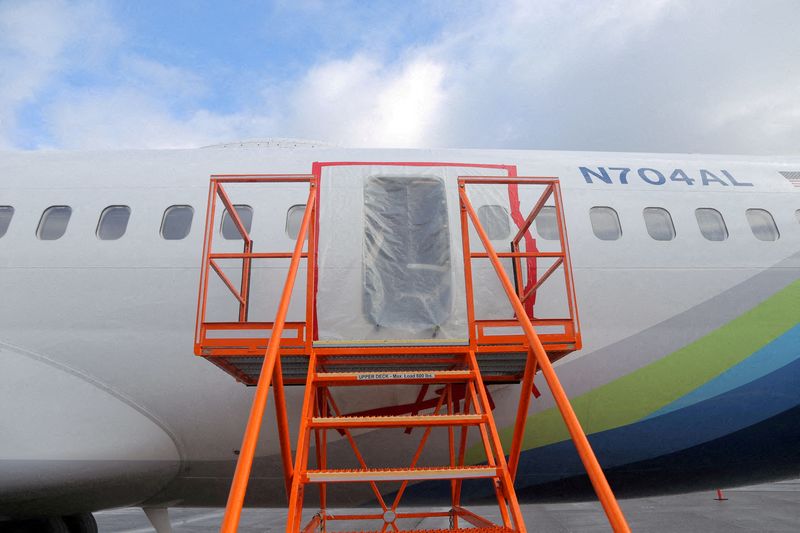
Boeing to withdraw MAX 7 exemption request as safety scrutiny intensifies
© Reuters. FILE PHOTO: The fuselage plug area of Alaska Airlines Flight 1282 Boeing 737-9 MAX, which was forced to make an emergency landing with a gap in the fuselage, is seen during its investigation by the National Transportation Safety Board (NTSB) in Portland,
By David Shepardson, Valerie Insinna and Tim Hepher
WASHINGTON/DUBLIN (Reuters) – Boeing (NYSE:BA) said on Monday it was withdrawing a request for a key safety exemption that could have allowed U.S. regulators to speed up certification of its coming 737 MAX 7, in the latest fallout from the planemaker’s ongoing crisis.
Lawmakers had been pressuring the planemaker to withdraw the petition following a harrowing mid-air cabin blowout on Jan. 5 that has exposed numerous safety and quality control concerns at one of the world’s two major jetmakers.
No one died in the blowout that left passengers staring at open space 16,000 feet above the ground and forced the pilots to make an emergency landing. But the incident has turned into a full-blown safety and reputational crisis for Boeing that will slow plane production and risks it ceding further market share to Airbus.
The withdrawal, first reported by Reuters, throws the anticipated timeline for certifying Boeing’s MAX 7 and the larger, better-selling MAX 10 into further doubt because it may force Boeing to make design changes more quickly than it had planned.
CEO David Calhoun withdrew the exemption request after being asked to do so in Capitol Hill meetings last week as Boeing grapples with growing safety concerns following the mid-air incident on a 737 MAX 9 jet operated by Alaska Airlines.
After its best-selling MAX family of jets resumed service following two fatal crashes, Boeing had at one point forecast it would win approval for the MAX 7 and 10 by the end of 2022. The head of the Federal Aviation Administration (FAA) has repeatedly declined to put any timetable on approval.
The ongoing delays have set back the fleet plans of major carriers including Southwest Airlines (NYSE:LUV) and United Airlines, the biggest customers for the MAX 7 and MAX 10 respectively.
Boeing’s decision to withdraw the exemption request came ahead of its fourth-quarter results on Wednesday. Shares were down 0.7% in premarket action Tuesday.
The exemption would have allowed the MAX 7 to be certified before making design changes to the nacelle inlet structure and engine anti-ice system to prevent overheating that could lead to severe damage or a failure of the engine inlet inner barrel.
The MAX 10 will also require design changes if an exemption is not sought. A nacelle is the structure that holds an aircraft engine.
Boeing originally proposed the MAX 7 exemption run through May 2026 – the time period the company believed necessary to develop and certify design changes, but approval of the request was thrown into doubt after the Alaska Airlines accident.
“While we are confident that the proposed time-limited exemption for that system follows established FAA processes to ensure safe operation, we will instead incorporate an engineering solution that will be completed during the certification process,” Boeing said in a statement, without providing an estimate of how long that would take.
The FAA deferred comment to Boeing.
DUCKWORTH, CALHOUN CONFER
U.S. Senator Tammy Duckworth, who leads the Senate Commerce Committee’s aviation safety subcommittee, said last week she requested that Boeing withdraw the exemption request during a meeting with CEO Calhoun.
Calhoun called Duckworth about the withdrawal decision, she said in a Monday evening interview with Reuters, adding that he thanked her for pushing the company to do “what is absolutely the right thing to do.”
Duckworth called the withdrawal “probably a tough decision for the shareholders and but also the right decision for the people who will be flying as passengers on the aircraft.”
Before the Alaska accident, Boeing was expected to release a new financial and delivery target for 2024 and provide an update on its forecast for 2025-26, the timeframe in which the planemaker’s operations were expected to stabilize.
Richard Aboualfia of AeroDynamic Advisory said a delay of MAX 10 certification could push customers into the arms of European rival Airbus, further eroding Boeing’s 40% share of the narrowbody market.
United Airlines CEO Scott Kirby (NYSE:KEX) flew to Toulouse recently to inquire whether it could buy A321neo jets to replace MAX 10 order slots, Reuters reported on Sunday.
Dennis Tajer, a spokesperson for the union representing American Airlines (NASDAQ:AAL) pilots, said Boeing’s decision to withdraw the exemption request was good news, but questioned what Boeing and the FAA would do for the MAX 8 and 9 models. “What are they doing about the planes that are flying now?” he said.
The FAA said last year Boeing was developing a design change to fix the problem on the MAX 8 and 9 and it might require it to put it in place on those planes in the future.
U.S. Senate Commerce Committee Chair Maria Cantwell said Boeing’s withdrawal “is good news. I hope this means they can quickly develop a compliant design across other MAX planes.”
Boeing had previously projected 737 production expected to reach 50 jets per month, but that is also in question after the FAA last week announced it would not approve further production rate increases for the 737 MAX.
MANAGEMENT IN FOCUS
Multiple sources told Reuters that industry speculation was swirling about various permutations of leadership changes at Boeing or its commercial division ahead of a U.S. National Transportation Safety Board (NTSB) report due in coming days and what could be a tricky hearing before Congress.
Executives at an Airline Economics conference in Dublin on Monday publicly backed Boeing’s management. “They’re under no illusions about the severity of the situation,” AerCap CEO Aengus Kelly told Reuters on the sidelines of an Airline Economics conference in Dublin Monday.
The door plug that blew out is present on most 737 MAX 9 planes, in place of an exit airlines could have added if they wanted a greater number of seats.
Trade publication The Air Current last week reported that the door plug on the affected MAX 9 reached Boeing’s factory from Spirit AeroSystems (NYSE:SPR) with bolts installed, but that the planemaker re-opened it to give access to nearby rivets that had been mis-installed by Spirit.
Spirit and Boeing referred queries on the probe to the NTSB. The agency’s chair Jennifer Homendy said on Jan. 18 it was too early to say if the root cause of the blowout was missing or mis-installed bolts.
Terms And Conditions
Privacy Policy
Risk Warning
Do not sell my personal information
© 2007-2024 Fusion Media Limited. All Rights Reserved.
Risk Disclosure: Trading in financial instruments and/or cryptocurrencies involves high risks including the risk of losing some, or all, of your investment amount, and may not be suitable for all investors. Prices of cryptocurrencies are extremely volatile and may be affected by external factors such as financial, regulatory or political events. Trading on margin increases the financial risks.Before deciding to trade in financial instrument or cryptocurrencies you should be fully informed of the risks and costs associated with trading the financial markets, carefully consider your investment objectives, level of experience, and risk appetite, and seek professional advice where needed.Fusion Media would like to remind you that the data contained in this website is not necessarily real-time nor accurate. The data and prices on the website are not necessarily provided by any market or exchange, but may be provided by market makers, and so prices may not be accurate and may differ from the actual price at any given market, meaning prices are indicative and not appropriate for trading purposes. Fusion Media and any provider of the data contained in this website will not accept liability for any loss or damage as a result of your trading, or your reliance on the information contained within this website.It is prohibited to use, store, reproduce, display, modify, transmit or distribute the data contained in this website without the explicit prior written permission of Fusion Media and/or the data provider. All intellectual property rights are reserved by the providers and/or the exchange providing the data contained in this website.Fusion Media may be compensated by the advertisers that appear on the website, based on your interaction with the advertisements or advertisers.

